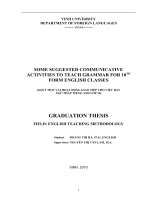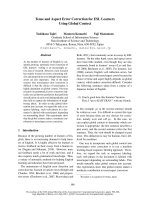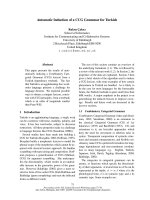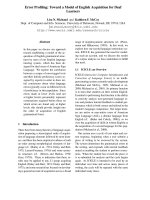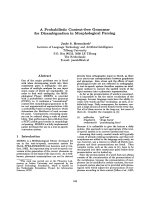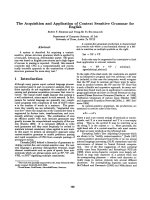GRAMMAR FOR ADVANCED LEARNERS ING FORM INFINITIVE
Bạn đang xem bản rút gọn của tài liệu. Xem và tải ngay bản đầy đủ của tài liệu tại đây (196.47 KB, 4 trang )
GRAMMAR NOTES FOR ADVANCED LEARNERS
-ing forms and infinitives
The -ing and infinitive forms of verbs are very common in English and can act as
subjects, objects and complements of verbs. When used like nouns, -ing forms are often
referred to as 'gerunds'. This lesson looks at the use of -ing forms and infinitives after
certain verbs, determiners, adjectives and nouns, and at the special use of infinitives to
describe purpose and result. (For the use of -ing and infinitive forms in clauses and
phrases and in the passive and perfect forms of participles and infinitives.)
-ING FORMS
A. We can use -ing forms of verbs in the same way that we use nouns as the subject,
object or complement of a verb. We often refer to -ing torms used in this way as
gerunds:
- Swimming makes you fit.
- The whole family has taken up cycling.
- Her worst habit is lying.
Sometimes -ing forms can have their own subjects and objects:
- I'm looking forward to my wife returning. (subject + -ing form)
- Meeting new people is one benefit of taking evening classes. (-ing form + object)
We can make a negative with not + -ing:
- Not getting a refund on faulty goods is what really annoys me.
But we use no + -ing to explain that something is impossible or not allowed:
- There’s not smoking in this office.
- There isn't smoking in this office.
=> Could you go outside? There's no smoking in this office.
There's no skiing here in the summer season. (= Skiing is impossible.)
No Parking (= Parking is not allowed here.)
B. We can use determiners, e.g. the, this; possessives, e.g. Peter's; possessive
adjectives, e.g. his; or object pronouns, e.g. him; before -ing forms. Object pronouns
are more common in informal English:
- All this complaining won't get you anywhere, you know.
- Peter's complaining didn't do him any good.
- Exorbitant tax rates led to his leaving the country.
- Exorbitant tax rates led to him leaving the country. (informal)
We often use an object + -ing form after verbs of the senses
- I heard Alagna giving a marvellous rendition of 'Nessun Dorma'.
We always use the object pronoun after sense verbs:
- Have you seen our performing get? => Have you seen us performing get?
(O When we use the + -ing form and we want to link it with an object, we use of:
- The giving presents is a traditional part of the Christmas festivities.
=> The giving of presents is a traditional part of the Christmas festivities.
We also use -ing forms as adjectives (also called present participles)
- The remaining items will be sold in our Januarg sale.
Many adjectives and nouns are followed by a preposition + -ing form:
- Lora isn't capable of lying and she has no reason for not telling the truth.
INFINITIVES
A. Infinitives with to can be the subject, object or complement of a verb:
- To give is better than to receive. Everyone loves to win.
We make a negative with not + infinitive:
- I tried not to look at the accident.
An infinitive can have its own subject, introduced with for:
- For evil to succeed it is only necessary for the good to do nothing.
In informal English we sometimes put an adverb between to and the infinitive. This
is known as a 'split infinitive' and we usually avoid it in formal English by putting the
adverb in another position:
- The doctor started to carefully remove the bandages.
=> The doctor started to remove the bandages carefully.
There are also perfect, continuous and passive forms of the infinitive lf, for example,
the person who is doing the action described by the infinitive is not the subject of the
sentence, we usually use the passive infinitive:
- The report is to hand in first thing tomorrow morning.
=> The report is to be handed in first thing tomorrow morning.
Infinitives of purpose and result
We can use an infinitive to describe the purpose or reason for an action:
- Cover the turkey in silver foil to keep the meat moist.
- To stop the train, pull the lever downwards.
We use for before the infinitive when the subject of the infinitive is different from the
subject of the sentence:
- She went to WalMart for to get some groceries.
=> She went to WalMart to get some groceries.
- We bought a cage for John to keep his hamster in.
In more formal English we can use in order or so as + infinitive of purpose:
- Interest rates have been raised in order to reduce inflationary pressures.
- We have removed the warning signs so as not to alarm members of the public.
The infinitive can also describe a result or something surprising, especially with only
and verbs such as find, discover, realise, etc.:
- They queued for hours at the box office only to discover thot the show was sold out.
We also use infinitives after too and enough to talk about results:
- That blue outfit was too informal to wear to the reception.
- There isn't enough (food) to go around, I'm afraid.
Infinitives after adjectives and nouns
Many adjectives, especially those describing feelings, can be followed by to +
infinitive (some common examples are given below):
- We're thrilled to welcome this year's prize winner onto the podium.
- The Bensons are lucky to be having such good weather.
adjective + to + infinitive: able / unable, afraid, anxious, ashamed, bound, careful
certqin, crazy, curious, due, eager, fit, happy, impossible, likely, lucky, pleased
right, shocked, stupid, sure, surprised, thrilled, welcome, wrong
Many nouns can be followed by to + infinitive (some common examples are in the list
below):
- She's finally made a decision to leave. - Clare would be a fool to marry him.
noun + to + infinitive: attempt, bid, decision, desire, incentive, need, nuisance,
opportunity, place, pleasure, reason, time, wish
We can use a noun + to + infinitive after there is / are and have (got) to express an
obligation:
- Don't disturb me, I've got a report to write this evening.
VERBS FOLLOWED BY -ING FORMS AND INFTNITIVES
A. Certain verbs (see below) can be followed by an -ing form, but not by an infinitive:
- I avoid to travel in the rush hour whenever possible.
=> I avoid travelling in the rush hour whenever possible.
With some of these verbs (marked * in the list below) we can also put an object before
the -ing form. Compare:
- Can you imagine wearing that dress! (verb + -ing form)
- Can you imagine Jemima wearing that dress! (verb + object + -ing form)
verb + -ing form admit, appreciate*, avoid*, burst out, can't help*, consider,
contemplate, defer, delay, deny, detest*, dislike*, endure*, enjoy*, escape, excuse*,
face*, fancy*, feel like, finish, give up, imagine*, involve*, justify*, keep (on), leave
off, mention*, mind*, miss*, postpone, practise, prevent*, put off, put sb off, recall*,
recommend, resent*, resist*, risk*, save, suggest, tolerate*, understand*
Certain verbs, particularly sense verbs (see below), are only followed by an –ing
form when they have an object:
- In 'Harnlet' the prince discovers hiding behind the curtains.
=> In 'Hamlet' the prince discovers Polonius hiding behind the curtains.
verb + object + -ing form catch, discover, feel, find, hear, leove, notice, observe, see,
spot, watch. (Those are sense verbs.)
The verbs advise, allow, forbid and permit are followed by an -ing form when they
have no object, but an infinitive when they have an object.
- The doctor advised taking a course of antibiotics.
- The dsctor advised him taking a eoarse of antibiotics.
=> The doctor advised him to take a course of antibiotics.
Certain verbs can be followed by an infinitive, but not by an -ing form:
- She's decided applying for the job. => She's decided to apply for the job.
Some of these verbs can also have an object before the infinitive (marked * below):
- He doesn't really expect her to pass the exam.
verb + infinitive afford, agree, aim, appear, arranget , ask*, attempt, beg*,
campaign1, care, choose*, consent, dare*, decide, demond, deserve 2, expect*, fail,
fight, forget, guarantee, happen, help*, hesitate, hope, intend*, long 1, manoge, need*,
neglect, offer, pause, plan1, prepqre, pretend, promise, propose, prove, refuse, seem,
swear, tend, threoten, trouble*, try, undertake, vow, wait1, want*, wish*, yearn
1
With these verbs we use for before the object + infinitive:
- We spent ages waiting them to arrive.
=> We spent ages waiting for them to arrive.
2
In British English, we can use deserve + -ing when it has a passive meaning:
- That naughtg child deserves smacking. (= deserves to be smacked)
Some verbs are followed by an infinitive only when they have an object
- They forced to open our suitcases. => They forced us to open our suitcases.
verb + object + to + infinitive advise allow, cause, command, compell, encourage,
forbid, force, get, instruct, invite, leave, oblige, order, permit, persuade, recommend,
remind, request, teach, tell, tempt, urge, warn
Note the special rules about infinitives after let, make, see, hear, know and help.
Many of the verbs followed by infinitives are used in reported speech.
Some verbs can be followed by an -ing form or an infinitive, with no difference in
meaning:
- I can't stand to see / seeing animals in pain.
verb + -ing form or infinitive attempt, begin, bother, can't bear, can't stand, cease,
continue, deserve, fear, hate, intend, like (= enjoy), love, prefer, start
We usually avoid putting two infinitives or two -ing forms together:
- He wanted to start to take lessons. => He wanted to start taking iessons.
We use to + infinitive after would like, would love and would hate:
- When we get there I would like taking a nap.
=> When we get there Iwould like to take a nap.
When like means 'think something is a good idea', we only use the infinitive. Compare:
- I like going to go to the gym. It's so relaxing. (= I enjoy visiting it.)
- Because of my weight problem I like to go to the gym at least twice a week.
(= I think this is a good idea.)
Some verbs can be followed by an -ing form or by to + infinitive, but there is a
difference in meaning:
verb
forget /
remember
go on
mean
verb + -ing torm
= forget/remember an earlier action:
- Do gou remember going to school
for the first time?
- I'll never forget meeting him.
= continue:
- They went on playing despite the
bad weather.
= involves or will result in:
verb + to + infinitive
= forget/remember to do a future
action:
- I must remember to setting alarm
clock tonight.
- Don't forget to lock the back door.
= change to another action:
- After opening the hospital the
Prince went on to meet the staff.
= intend to do something:
regret
stop
try
- This new job means living
abroad.
= feel sorrow about the past:
- I reatty regret getting that tattoo
when I was eighteen.
= finish an action:
- They stopped making fax machines
about ten years ago.
= do something to see what will
happen:
- Try using a screwdriver to get the
lid off.
- The builders mean to finish by
Friday.
= announce bad news:
- We regret to inform gou of delags
in today's service.
= finish one action in order to do
- We stopped to get petrol.
= make an effort to do something
difficult:
- We tried to get tickets but the show
was sold out.
PRACTICE
I. Underline the mistakes in these sentences and correct them.
0. A great advantage of credit cards is not having to carry cash around all the time
....not....
1. Have you ever heard my singing O Sole Mio?
.............
2. We had to come in early for the opening the new extension.
.............
3. Constant criticisms led to she resigning from that stressful job.
.............
4. You'll have to put that out, sir, this is a not smoking carriage.
.............
5. Passengers can find a heated wait room adjacent to platform ten.
.............
6. The making a successful soufflé requires expert timing.
.............
7. There's not swimming from this beach, the current's too treacherous.
.............
8. The argument ended up with we demanding a refund and compensation.
.............
9. They stopped to make vinyl records ages ago.
.............
10. The crane isn't capable lifting it - it's too heavy.
.............
II. Finish each of the following sentences in such a way that it is as similar as
possible in meaning to the sentence before it.
0. I really don't want to see him again.
=> I have no desire to see him again.
1. I want you to hand the report in tomorrow.
The report is .....................................................................
2. You can't join the army because you aren't sufficiently fit.
You aren't fit ....................................................................
3. He was very worried that he would arrive late.
He was anxious not...........................................................
4, Right now I'm afraid I can't give you an answer.
I am not.............................................................................
5. The government closed the borders with the aim of catching the criminals.
In order..............................................................................
6. Closing the office was something the manager decided this morning.
The manager made............................................................
7. I learnt that Amanda was going to marry Ronald, which was surprising.
I was ...............................................................................
8. They didn't publish the news because they didn't want to frighten the public.
They didn't publish the news so..........................................
9. Checking the balance on my current account was my main reason for visiting the
bank this morning.
I went................................................................................
10. When we got there they had already closed the store for stocktaking!
We got there only...............................................................
III. Complete the sentences with the correct form of the verbs in brackets.
1. I'm not disappointed, I never really expected .......... (pass) the test.
2. Please don't hesitate .......... (call) if you have any problems.
5. The doctor recommended .......... (avoid) strenuous activity for the first few weeks.
4. The sales team aims .......... (exceed) its target by at least five per cent this year.
5. I don't suppose you happened .........(notice) whether there was a cash machine there?
6. How on earth do they justify.......... (keep) three dogs in such a small flat?
7. We'd better hurry up; I'd hate.......... (arrive) late.
8. Despite all the rejections, Dave's continuing .......... (apply) for every vacancy he sees.
9. We discovered an old document ......... (lie) under the floorboards.
10. l'll put off .......... (call) them until after I've spoken to the personnel officer.
11. You can watch the film if you promise .......... (go) to bed straight afterwards.
12. Being a diabetic, I like .......... (avoid) anything containing sugar.
13. Thanks very much. Yes, we'd love .......... (join) you for dinner on Friday.
14. You really can't help ..........(feel) sorry for the poor guy.
l5. Passengers are permitted ..........carry) only one piece of hand luggage onto the plane.
16. Jonathan's the one who taught Rachel (swim) last summer.
17. Sometimes you have to pretend (like) people that you detest.
18. That's strange, ldon't recall ......... (meet) him at all.
19. The judge will defer .......... (pass) sentence until the psychiatric reports have been
submitted.
20. Whenever possible, the personnel department likes .........(settle) salary reviews prior
to the quarterly board meeting.
IV. Underline the correct form in italics.
1. Darling, did you remember packing / to pack some spare cassettes for the video
camera yesterday?
2. I really regret leaving / to leave school so young, it's ruined my career prospects.
3. We tried pressing / to press the 'escape' key but the program just wouldn't respond.
4. A suspicious young man was seen enter / to enter the building shortly before the
incident.
5. As we drove over the river, we noticed local women washing / wash their clothes in
the water.
6. I once heard Karajan conducting / conduct the entire Ring cycle - it was wonderful.
7. stopped eotinglto eat sugar years ago.
8. Nothing will stop their enquiries, they mean getting / to get to the bottom of this
strange business.
9. Don't forget recording / to record 'East Enders' tomorrow evening.
10. The woman woke up in the middle of the night, looked out of her window and saw
something strange hovering / hover over the trees in the park.
11. After a career in the secret service, lan Fleming went on achieving / to achieve fame
as an author.
12. Transglobe Airlines regrets announcing / to announce the cancellation of today's
service to lstanbul due to air traffic restrictions.
13. Do you remember seeing / to see that film last summer?
14. If you can't find the information in the manual, try looking / to look at our website.
15. We were all exhausted so we stopped getting / to get some rest at a motel.
V. Read the article below and then decide which word or phrase (A-C) best fits
each space. The exercise begins with an example (0).
DEATH IN THE AIR
The death of Emma Christofferson from deep-vein thrombosis allegedly caused by a
twenty-hour plane journey has led to calls for an enquiry into so-called 'economy class
syndrome'. The cabin crew were shocked (0)....B....the previously heatthy 28-year-old in
a state of collapse at lhe end of a long-haul flight from Australia to London. A blood
clot had spread from her legs to her lungs with fatal results. Experts believe her death is
just the latest example of the growing danger posed by (1).......for extended periods of
time in cramped aircraft seats.
Farol Khan, director of the Aviation Health Institute, (2).......to have evidence that
more than 6,000 passengers a year die of deep-vein thrombosis (DVT) as a result of
long-haul flights. Unfortunately, as symptoms often take some time (3)......, the link
between the condition and flying is not always apparent. But there seems (4).......a clear
relationship between the occurrence of DVT and the steady reduction in the amount of
legroom between seats in economy class cabins. In a bid (5)........the number of
passengers carried and their consequent profitability, many airlines have squeezed more
and more seats into their planes, at the cost of comfort and legroom. And our
(6)........these uncomfortable conditions is simply based on the fact that we know more
seats means lower prices. But with limited opportunities (7)........or move around, the
blood circulation in passengers' legs (8)........to slow down, and blood clots can easily
develop. Most at risk are elderly people, sufferers from heart conditions and smokers.
But as Emma Christofferson's case shows, even the young and healthy can do little to
prevent blood clots (9).....under these circumstances. (10).....a 'caring. sharing' image is
something many airlines are keen on, and some of these have finally (11)........to take
the problem more seriously by issuing health advice to passengers 'trapped' on their
longhaul flights. They usually recommend (12)........the legs and feet regularly, and
advise (13)........walks up and down the aisle at least once an hour. But, as any
experienced traveller knows, the aisles on most planes are only just wide enough for the
trolleys (14)........through. It is often impossible (15)........down the aisle (16)........to the
toilets, let alone(17)........exercise.
The truth is that until we are all prepared to (18)........paying rock-bottom prices for
long distance travel, the airlines will have no incentive (19).....conditions. And a return
to exclusive and expensive air travel is something nobody would (20)........advocating.
0. A. finding
B. to find
C. to be found
1. A. sitting
B. to sit
C. sit
2. A. suggests
B. admits
C. claims
3. A. appearing
B. to appear
C. having appeared
4. A. being
B. to be
C. be
5. A. increasing
B. of increasing
C. to increase
6. A. putting up with
B. put up with
C. to put up with
7. A. stretching
B. to stretch
C. stretch
8. A. begins
B. risks
C. can't help
9. A. occuring
B. to occur
C. occur
10. A. promoting
B. to promote
C. to be promoted
11. A. suggested
B. considered
C. started
12. A. moving
B. to move
C. move
13. A. taking
B. to take
C. take
14. A. getting
B. to get
C. get
15. A. walking
B. to walk
C. walk
16.. A. getting
B. to get
C. get
17. A. taking
B. to take
C. take
18. A. give up
B. fail
C. refuse
19. A. improving
B. to improve
C. improve
20. A. undertake
B. choose
C. comtemplet
ANSWER KEY
I. 1. my - me 2. opening the => opening of the 3. she => her 4. not => no 5. wait => waiting
6. malring a => making of a 7. not => no 8. we => us/our 9. to make => making
10. capable lifting => capable of lifting
II. 1. to be handed in tomorrow.
2. enough to join the army. 3. to arrive late.
4. able to/allowed to/permitted to/free to give you an answer right now.
5. to catch the criminals the government closed the borders. 6. a decision to close the office this morning.
7. surprised to learn that Amanda was going to marry Ronald. 8. as not to frighten the public.
9. to the bank this morning to check the balance on my current account.
10. to find / discover they had already closed the store for stocktaking!
III. 1. to pass 2. to call 3. avoiding 4. to exceed 5. to notice
6. keeping 7. to arrive 8. to apply 9. lying
10. calling
11. to go 12. to avoid 13. to join 14. feeling 15. to carry
16. to swim 17. to like 18. meeting 19. passing 20. to settle
IV. 1. to pack
2. leaving
3. pressing 4. to enter 5. washing
6. conduct 7. eating
8. to get
9. to record 10. hovering
11. to achieve 12. to announce 13. seeing 14. looking 15. to get
V. 1. to say 2. to ask 3. to find 4. bringing 5. cooking 6. living 7. to make 8. filling in 9. to see 10. to take
11. to open 12. To cash 13. buying 14. To be 15. to know 16. wondering 17. to join 18. learning
19. to attend 20. to write

